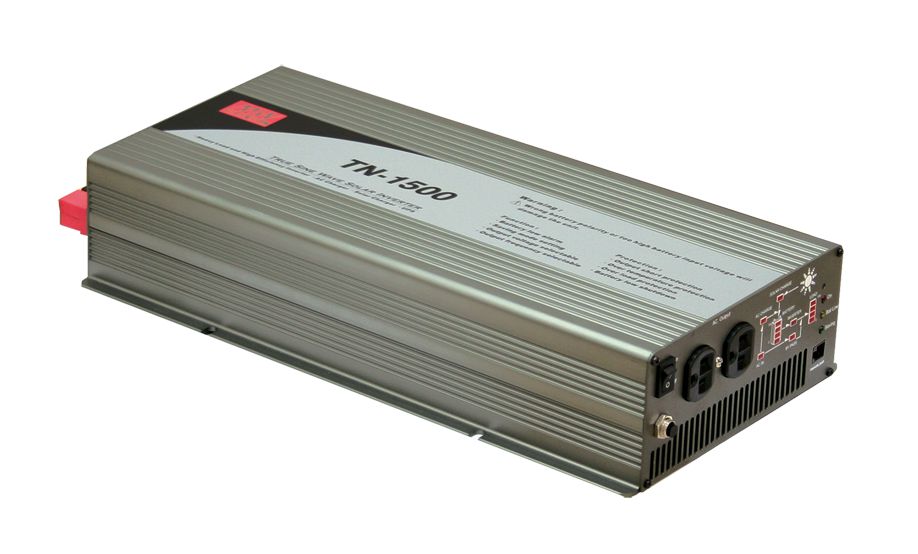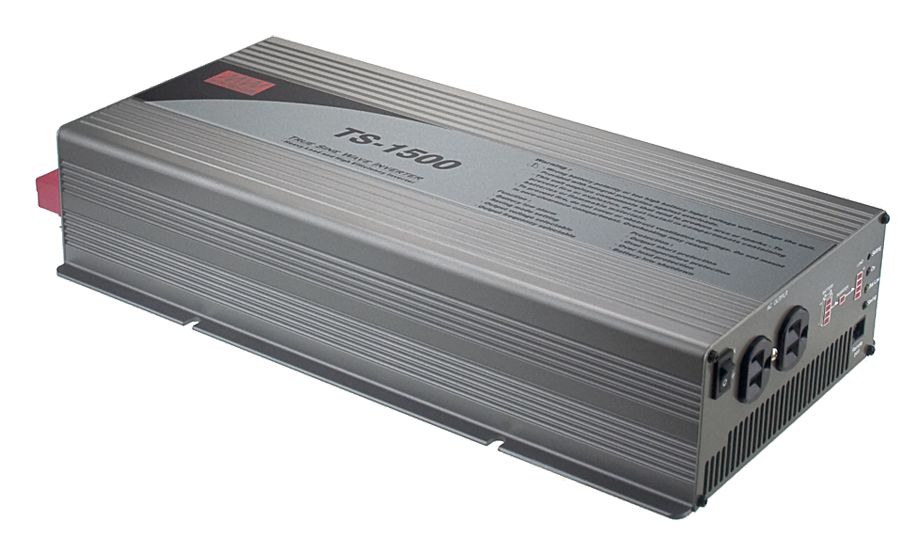DC AC Converters
-
Power Supply
- LED Power Supply Units
- Switching Power Supplies
- Programmable Power Supplies
- Battery Charger
- DIN Rail Power Supplies
- Universal Power Supplies
- Desktop Power Supplies
- Plug-in Power Supplies
- DC DC Converter
-
DC AC Converters
- Medical Power Supplies
- KNX Home Automation
- Safety Power Supplies
- Power Supply Mounting Material
- Active Components
- Samwha Capacitors
- Workshop and Soldering Equipment
- Measurement and Testing Equipment
- Remote Controls
- Residual Current / Circuit Breaker
- Product num. : 104758
- EAN: 4021087006156
- Manufacturer: MEAN WELL
- Manufacturer number: A301-100-F3
-
Show more
-
From 1€43.18*
-
From 50€41.75*
-
From 100€39.65*
Available, delivery time: 1-3 days
- Product num. : 104760
- EAN: 4021087006149
- Manufacturer: MEAN WELL
- Manufacturer number: A301-150-F3
-
Show more
- Output Voltage: 230V AC
- Series: A301/302-150-F3
-
From 1€43.37*
-
From 50€41.92*
-
From 100€39.82*
Available, delivery time: 1-3 days
- Product num. : 104766
- EAN: 4021087006132
- Manufacturer: MEAN WELL
- Manufacturer number: A301-1K0-F3
-
Show more
- Output Voltage: 230V AC
- Series: A301/302-1K0-F3
-
From 1€244.72*
-
From 50€237.48*
Currently not available (delivery time on request)
- Product num. : 104768
- EAN: 4021087006125
- Manufacturer: MEAN WELL
- Manufacturer number: A301-1K7-F3
-
Show more
- Output Voltage: 230V AC
- Series: A301/302-2K5-F3
-
From 1€356.60*
-
From 50€346.05*
Available, delivery time: 1-3 days
- Product num. : 104770
- EAN: 4021087006118
- Manufacturer: MEAN WELL
- Manufacturer number: A301-2K5-F3
-
Show more
- Output Voltage: 230V AC
- Series: A301/302-2K5-F3
-
From 1€665.99*
-
From 50€646.29*
Available, delivery time: 1-3 days
- Product num. : 104762
- EAN: 4021087006101
- Manufacturer: MEAN WELL
- Manufacturer number: A301-300-F3
-
Show more
- Output Voltage: 230V AC
- Series: A301/302-300-F3
-
From 1€64.79*
-
From 50€62.61*
-
From 100€59.47*
Available, delivery time: 1-3 days
- Product num. : 104764
- EAN: 4021087006095
- Manufacturer: MEAN WELL
- Manufacturer number: A301-600-F3
-
Show more
- Output Voltage: 230V AC
- Series: A301/302-600-F3
-
From 1€118.86*
-
From 50€114.88*
-
From 100€109.12*
Available, delivery time: 1-3 days
- Product num. : 104759
- EAN: 4021087006088
- Manufacturer: MEAN WELL
- Manufacturer number: A302-100-F3
-
Show more
-
From 1€43.18*
-
From 50€41.75*
-
From 100€39.65*
Available, delivery time: 1-3 days
- Product num. : 104761
- EAN: 4021087006071
- Manufacturer: MEAN WELL
- Manufacturer number: A302-150-F3
-
Show more
- Output Voltage: 230V AC
- Series: A301/302-150-F3
-
From 1€45.69*
-
From 50€44.16*
-
From 100€41.94*
Available, delivery time: 1-3 days
- Product num. : 104767
- EAN: 4021087046978
- Manufacturer: MEAN WELL
- Manufacturer number: A302-1K0-F3
-
Show more
-
From 1€278.52*
-
From 50€271.41*
-
From 100€264.39*
Currently not available (delivery time on request)
- Product num. : 104769
- EAN: 4021087006064
- Manufacturer: MEAN WELL
- Manufacturer number: A302-1K7-F3
-
Show more
- Output Voltage: 230V AC
- Series: A301/302-2K5-F3
-
From 1€356.60*
-
From 50€346.05*
Available, delivery time: 1-3 days
- Product num. : 104771
- EAN: 4021087006057
- Manufacturer: MEAN WELL
- Manufacturer number: A302-2K5-F3
-
Show more
- Output Voltage: 230V AC
- Series: A301/302-2K5-F3
-
From 1€665.99*
-
From 50€646.29*
Currently not available (delivery time on request)
- Product num. : 104763
- EAN: 4021087006040
- Manufacturer: MEAN WELL
- Manufacturer number: A302-300-F3
-
Show more
- Output Voltage: 230V AC
- Series: A301/302-300-F3
-
From 1€64.79*
-
From 50€62.61*
-
From 100€59.47*
Available, delivery time: 1-3 days
- Product num. : 104765
- EAN: 4021087006033
- Manufacturer: MEAN WELL
- Manufacturer number: A302-600-F3
-
Show more
- Output Voltage: 230V AC
- Series: A301/302-600-F3
-
From 1€118.86*
-
From 50€114.88*
-
From 100€109.12*
Available, delivery time: 1-3 days
- Product num. : 105070
- Manufacturer: MEAN WELL
- Manufacturer number: NTS-450-224EU
-
Show more
-
From 1€116.82*
-
From 50€114.91*
-
From 100€111.08*
Available, delivery time: 1-3 days
- Product num. : 104788
- EAN: 4021087000178
- Manufacturer: MEAN WELL
- Manufacturer number: TN-1500-212B
-
Show more
- Output Voltage: 230V AC
- Series: TN-1500
-
From 1€575.08*
-
From 50€558.09*
Available, delivery time: 1-3 days
- Product num. : 104789
- EAN: 4021087000161
- Manufacturer: MEAN WELL
- Manufacturer number: TN-1500-224B
-
Show more
- Output Voltage: 230V AC
- Series: TN-1500
-
From 1€575.08*
-
From 50€558.09*
Currently not available (delivery time on request)
- Product num. : 104790
- EAN: 4021087040747
- Manufacturer: MEAN WELL
- Manufacturer number: TN-1500-248B
-
Show more
- Output Voltage: 230V AC
- Series: TN-1500
-
From 1€652.76*
-
From 50€636.11*
-
From 100€619.65*
Currently not available (delivery time on request)
- Product num. : 104784
- EAN: 4021087000130
- Manufacturer: MEAN WELL
- Manufacturer number: TS-1500-212B
-
Show more
- Output Voltage: 230V AC
- Series: TS-1500
-
From 1€501.67*
-
From 50€486.84*
Available, delivery time: 1-3 days
- Product num. : 104785
- EAN: 4021087000116
- Manufacturer: MEAN WELL
- Manufacturer number: TS-1500-224B
-
Show more
- Output Voltage: 230V AC
- Series: TS-1500
-
From 1€501.67*
-
From 50€486.84*
Currently not available (delivery time on request)
DC AC converters: Indispensable components for power conversion
Introduction to DC AC converters
DC AC converters, also known as inverters, are essential devices that convert direct current (DC) into alternating current (AC). This technology is crucial for use in a wide range of applications, from household appliances to industrial applications. Inverters enable the operation of devices designed for use with alternating current in environments where only direct current is available, such as in solar systems or battery operation.
Functionality and technical features
A DC AC converter works by converting a constant direct current into varying alternating current. This happens in several stages: First, the DC is converted into high-frequency current, which is then modulated and filtered to achieve the desired AC voltage. This technical mechanism allows the output parameters of the AC to be precisely controlled, which is relevant for both standard applications and special requirements.
Important technical features include voltage range, efficiency, performance and protection mechanisms such as overload and short-circuit protection. Modern converters are often equipped with intelligent control systems that allow them to adapt to different grid conditions, increasing operational safety and efficiency.
Application areas of DC AC converters
DC AC converters are used in a wide range of applications. One of the most common uses is in photovoltaic systems. Here, they convert the direct current generated by solar panels into grid-compatible alternating current, which can either be used directly or fed into the public grid.
Another important area of application is the use in uninterruptible power supplies (UPS), where batteries serve as an emergency power source. In the event of a power failure, the stored direct current is converted into alternating current to continue supplying sensitive electronic devices with power.
Advantages and disadvantages of using inverters
The biggest advantage of DC AC converters is their versatility and flexibility. They make it possible to operate devices that rely on alternating current in direct current environments. They also offer high efficiency and can therefore help to reduce energy losses.
One disadvantage could be the complexity and initial cost of purchase. High-quality inverters are often more expensive and require careful planning and installation. Nevertheless, the advantages outweigh the disadvantages in most applications, especially when long-term energy savings and operational reliability are taken into account.
Technological developments and innovations
In recent years, significant technological advances have increased the efficiency and functionality of DC AC converters. The introduction of soft-switching technologies and improved semiconductor materials has led to more compact, efficient and reliable devices. The integration of control systems and communication interfaces that enable remote monitoring and control are also increasingly standard.
With the emergence of smart energy grids and the increasing use of renewable energies, innovation in the field of inverters plays a key role in further improving grid stability and energy efficiency.
Quality criteria and purchasing advice
When purchasing a DC AC converter, various quality criteria should be taken into account. These include the performance of the device, the efficiency class, the availability of protection mechanisms and compatibility with existing power sources and consumers.
A well-founded purchase decision should always be based on a detailed analysis of the specific requirements. Expert advice and customer reviews can help you make the right choice.
Conclusion and future prospects
DC AC converters are indispensable components in modern energy systems. They offer a wide range of possible applications, from use in solar power systems to securing the power supply in the event of grid failures. Technological innovations are making these devices ever more efficient and powerful, which continues to make their use attractive and future-oriented.
The increasing integration of renewable energies into power grids and the development of smart energy solutions will further increase the demand for high-quality DC AC converters in the coming years. Investments in this technology are therefore a promising option for companies and private individuals alike to optimize their energy efficiency and security of supply.


